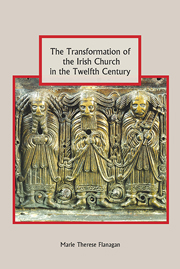Book contents
- Frontmatter
- Contents
- Acknowledgements
- Abbreviations and short titles
- Introduction
- 1 Charting change in the twelfth-century Irish church: the problem of sources
- Bishops and dioceses
- 2 ‘Regulating the dioceses of the bishops of Ireland’
- 3 ‘A mirror and model’: exemplary bishops and episcopal culture
- Varieties of monasticism
- Lay society
- Conclusion: Universal ideals and regional responses
- Bibliography
- Index
3 - ‘A mirror and model’: exemplary bishops and episcopal culture
from Bishops and dioceses
Published online by Cambridge University Press: 05 October 2013
- Frontmatter
- Contents
- Acknowledgements
- Abbreviations and short titles
- Introduction
- 1 Charting change in the twelfth-century Irish church: the problem of sources
- Bishops and dioceses
- 2 ‘Regulating the dioceses of the bishops of Ireland’
- 3 ‘A mirror and model’: exemplary bishops and episcopal culture
- Varieties of monasticism
- Lay society
- Conclusion: Universal ideals and regional responses
- Bibliography
- Index
Summary
In the absence of a substantial body of episcopal legislation, acta or treatises testifying to a discourse of reform, some insight into the conception of the exemplary way of life and pastoral responsibilities of a bishop, as formulated in an Irish reformist context, is afforded by hagiographical sources. Of these, Bernard of Clairvaux's Life of Malachy and the anonymous Life of Flannán are especially useful because their composition may be dated reasonably accurately. The Life of Flannán can be assigned to 1162×67, a date-range determined by an allusion to the recent (noviter) capture of Milan by Emperor Frederick Barbarossa, which occurred in 1162, and the account of a dispute between two Munster kings. While it has been argued that the two major themes of this life are ‘kingship and the rights and privileges of the church’, an even more persuasive case can be made for the portrayal of an exemplary bishop as its overriding concern. St Flannán was the patron of the church of Killaloe and of its appurtenant twelfth-century diocese, which was coterminous with the Dál Cais political heartland of the Ua Briain dynasty, whose kings were leading supporters of reformist change. The Life was redacted from earlier materials, possibly by a member of the episcopal household, but at any rate by someone who described Flannán as his patronus, to whom he was attached by a vow of service.
- Type
- Chapter
- Information
- Publisher: Boydell & BrewerPrint publication year: 2010



